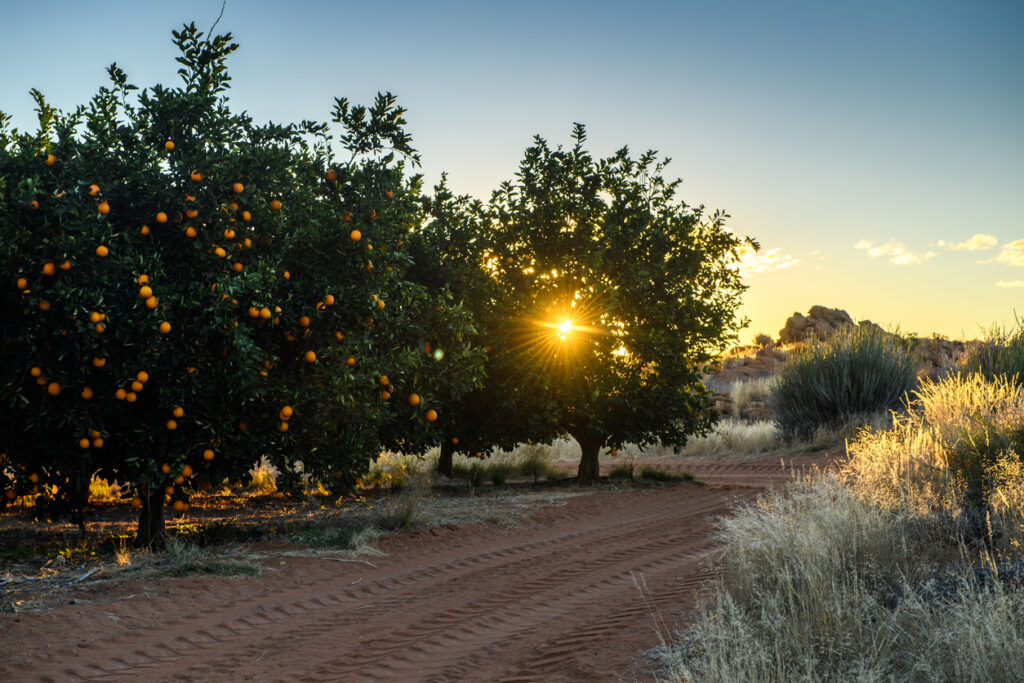
CropX’s precision irrigation system was tested against conventional irrigation practices on fifty grapefruit trees in California. The controlled trial demonstrated that CropX technology delivered a 14% yield increase while achieving 68% water savings compared to traditional sprinkler irrigation methods.
California grapefruit growers face intensifying water scarcity challenges that threaten both profitability and long-term viability. Traditional irrigation methods often apply water based on schedules rather than actual plant needs, leading to inefficient resource use during increasingly severe drought conditions.
Citrus trees require precise water management to maintain fruit quality and consistent yields. Over-irrigation wastes precious water resources and can lead to root problems, while under-irrigation stresses trees and reduces fruit production. Growers need irrigation solutions that can optimize both water use efficiency and crop productivity.
Grapefruit trees respond sensitively to soil moisture variations, with water stress directly impacting fruit development and overall tree health. Traditional sprinkler systems with timer-based controllers cannot adapt to changing soil conditions or weather patterns. This inflexibility results in either water waste during periods when trees don’t need irrigation or inadequate moisture during critical growth periods.
California’s water regulations and rising costs make efficient irrigation essential for maintaining profitable operations. Growers must demonstrate responsible water use while maintaining production levels to remain economically viable.
A controlled field trial was established using grapefruit trees to directly compare conventional irrigation practices with CropX precision irrigation recommendations. The trial design eliminated variables by using trees from the same grove with identical growing conditions, soil types, and microclimates.
Control trees continued using the grower’s existing sprinkler irrigation system. This system operated on predetermined schedules based on traditional timing approaches. A separate automated irrigation system was installed for trees receiving CropX irrigation advice, allowing for direct performance comparison under identical conditions.
The CropX system utilized soil moisture sensors and weather data to provide real-time irrigation recommendations. The automated system could adjust water application based on actual soil conditions rather than fixed schedules, optimizing irrigation timing and volume for current tree needs.
The CropX-managed trees achieved remarkable water savings of 68% compared to conventional irrigation practices. This dramatic reduction in water use addressed the critical resource constraints facing California agriculture while maintaining tree health and productivity.
Despite using significantly less water, CropX-irrigated trees delivered a 14% yield increase over conventionally irrigated trees. This combination of reduced input costs and increased production created substantial economic benefits for the grower.
The precision irrigation approach eliminated the guesswork involved in traditional irrigation scheduling. Automated adjustments based on real-time data reduced labor requirements while ensuring optimal water application timing. The system’s responsiveness to changing conditions provided consistent tree performance throughout the growing season.
The trial’s success stemmed from the CropX system’s ability to match water application precisely to tree needs rather than following rigid schedules. Real-time soil moisture monitoring enabled irrigation adjustments that prevented both water waste and plant stress.
The automated response capability proved essential for optimizing irrigation timing. While conventional systems relied on predetermined schedules that couldn’t adapt to weather changes or varying soil conditions, the CropX system adjusted water application based on actual field conditions.
The 68% water savings achieved while increasing yields by 14% demonstrates that water efficiency and productivity are not competing objectives in citrus production. This finding has significant implications for California’s agricultural sector, where water conservation requirements continue to intensify.
The controlled trial methodology provides compelling evidence that precision irrigation technology can deliver measurable improvements over traditional practices. The direct comparison eliminates questions about environmental variables that might influence results in broader field studies.
Precision irrigation technology can simultaneously address California agriculture’s two primary challenges: water scarcity and production efficiency. The CropX system demonstrated that significant water savings are achievable without sacrificing yields, creating both environmental and economic benefits.
The controlled trial validates precision irrigation as a practical solution for citrus growers facing increasing water constraints. The technology’s ability to optimize resource use while improving productivity makes it essential for sustainable citrus production in water-limited regions.
Julia brings with her more than 20 years of experience in corporate development, partnerships, M&As and business strategy.
Prior to joining CropX, Julia held roles such as Corporate Development Director at STK Bio-Ag Technologies, a leading global biopesticide company, and as Deputy Head of M&A at Caisse des Depots et Consignations in France. Earlier in her career, Julia served as an AVP at Lazard Freres Investment Banking and as a Manager at KPMG Corporate Finance.
Julia holds an MBA from ESSEC Business School in France.